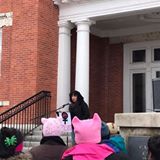On Tuesday, January 30, 2018, Lewiston State Bank announced its commitment to sponsor a home in Citizens Against Physical and Sexual Abuse’s Independence Neighborhood.
The neighborhood consists of nine homes, and serves as transitional housing for clients leaving emergency shelter. Residents can stay for up to two years and they pay rent on a sliding scale, based on family size and income levels.
“When your life’s been seemingly shattered, it takes a while to put it back together,” Jill Anderson, CAPSA’s executive director said. “Independence Place provides individuals with both the time and physical space to heal and progress beyond abuse.”
Lewiston State Bank’s donation of $6,000 will provide a year of housing assistance for a family in need, specifically a low-or moderate-income family.
“Schreiber’s, Wasatch Properties, Sports Academy, Riverwoods, and Conservice helped us build the homes in 2015,” said James Boyd, CAPSA’s development director. “But continued funding is needed to assist families living in the neighborhood today. I hope Lewiston State Bank is the first of many organizations to donate and sponsor a home for a family in need.”
Dale Buxton, president of Lewiston State Bank said he chose to sponsor a home for CAPSA because he knows how important it is for individuals to have a loving, happy place to come home to.
“We spend -many hours helping first-time home buyers finance their dream house,” Buxton said. “We see the joy and anticipation in their eyes. We see their hope for a future. We’ve seen how having a place to call yours impacts people. For that reason, we wanted to make transitional housing affordable for CAPSA clients.”
Boyd said there’s no way to fully express the magnitude of the bank’s gift.
“You can’t put a price on safety or security,” Boyd said.
Learn how you can sponsor a home for CAPSA clients by contacting James Boyd at james@capsa.org or (435) 753-2500.
Learn more about mortgages from Lewiston State Bank by contacting the Lewiston State Bank mortgage department at 435-753-1800.
# # #

